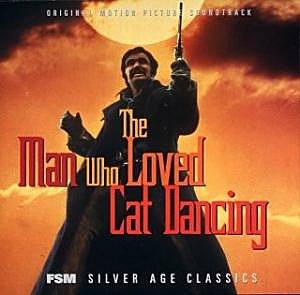************************************************************** EDITOR’s RECOMMENDATION June 2002 **************************************************************
John WILLIAMS (with unused score material by Michel LEGRAND)
The Man Who Loved Cat Dancing
OST
FILM SCORE MONTHLY Vol. 5 No. 4 [65:37]
Available from Film Score Monthly, 8503 Washington Boulevard, Culver City, CA90232; Tel: 1-888-345-6335; overseas: 310-253-9595; fax: 310-253-9588; email: Info@filmscoremonthly.com

The Man Who Loved Cat Dancing (1973) was an unsuccessful Western from the dog days of the genre. Maybe it was the potentially puzzling and misleading title, but this romance starring Burt Reynolds and Sarah Miles rapidly vanished into obscurity, so much so that this is the first ever release of John Williams' score. And not just that, but also the recorded parts of a rejected score by Michel Legrand.
Legrand recorded just over 20 minutes of his score on the 6-8 June 1973, enough for the producers to decide it was not what they wanted, and to almost immediately hire Williams. Who almost unbelievably wrote a 37 minute score in less than a week, recording it on June 14-15 of the same month! Not having seen the film I have no idea how well his work functions for its intended purpose, but it makes for a satisfying album.
Williams' The Man Who Loved Cat Dancing is scored for an orchestra of 42 plays at most, featuring typically Western banjos, harmonica, guitar and strings as well as keyboards, percussion, flutes, clarinets, trumpets and horns. There are 26 cues spread across 16 tracks and the sound is excellent, the music ranging from sweeping Americana to quirky, semi-comical underscore "Bound Up", to sparsely scored folk textures. The main theme, which given the amount of time Williams had to write the score, is unsurprisingly, given considerable air in various guises, is a distinctively lilting affair with a descending keyboard motif. While the main title adds an understated contemporary rhythm section - making the cue like a premonition of composer's Earthquake (1974) - elsewhere the music ranges from introspective Hermannesque strings - "The Aftermath" to modernistic percussion, "Boys Will Be". It is recognisable as first-half-of-the-70's Williams - "The Aftermath" evokes the dissonance of the composer's Jane Eyre (1970) - though much smaller in scale than his post Jaws (1975) / Star Wars (1977) 1970's work. Williams has rarely returned to this sort of folksy charm since, though The River (1984) offers comparable down home intimacy. The delicacy of such cues as the beautifully orchestrated "Deserted Hotel/What's Your Name" is really remarkable given the conditions under which the score was written.
Before his score was rejected Michel Legrand recorded his main title and around a further 20 minutes of music which has been compiled into two suites for this album. Also included is a typical Legrand jazz improvisation on his theme, the composer at the piano providing his own vocals. Anyone who has heard the complete 2CD set of the composer's Les Parapluies de Cherbourg (1964) will have an idea of what to expect.
It's easy to hear why the great Frenchman's score was rejected. His music was simply a little too odd, for Hollywood. Legrand's approach was to emphasis the Indian spiritual aspects of the tale. As the booklet notes point out, his music is "virtually devoid of the traditional Americana and suspense cues included in Williams's score" - though it may be that he never got around to recording anything he may have composed in a more conventional vein.
Legrand composed for an approximately 40 piece orchestra, augmented by cymbalom, ocarina, recorder, sarod, electric guitar, and his own vocal impressions of cappella Indian chant - a European approach to the West more akin to Morricone than Copland. Legrand's beloved harpsichord is in evidence, as are numerous of the composer's stylistic touches - stop start rhythms, oblique yet catchy melodies, striking instrumental combinations. Some of the writing has a peculiar beauty of its own, and it would be most interesting to see what this almost World Music assemblage would be like with the film. Unfortunately when Legrand attempts his Indian vocals he sometimes sounds too much like Michel Legrand, and very strangely, sometimes like the Sami singer, Mari Boine. Perhaps he should have contracted a genuine Indian singer.
Nevertheless, Legrand's score would have made for a bolder, perhaps more distinctive film than the one released with Williams attractive but more conventional score. Who can say which would have been "best"? It is rare to have two scores for one film on the same album and together they make for a rewarding and unusual album, though perhaps one to recommend more to serious film music aficionados than casual collectors. Anyone looking for big, rousing John Williams action adventure won't find it here, while Legrand's writing is a long way from his famous and well loved romantic themes. This being a Film Score Monthly release the packaging is excellent.
Gary S. Dalkin

Return to Index